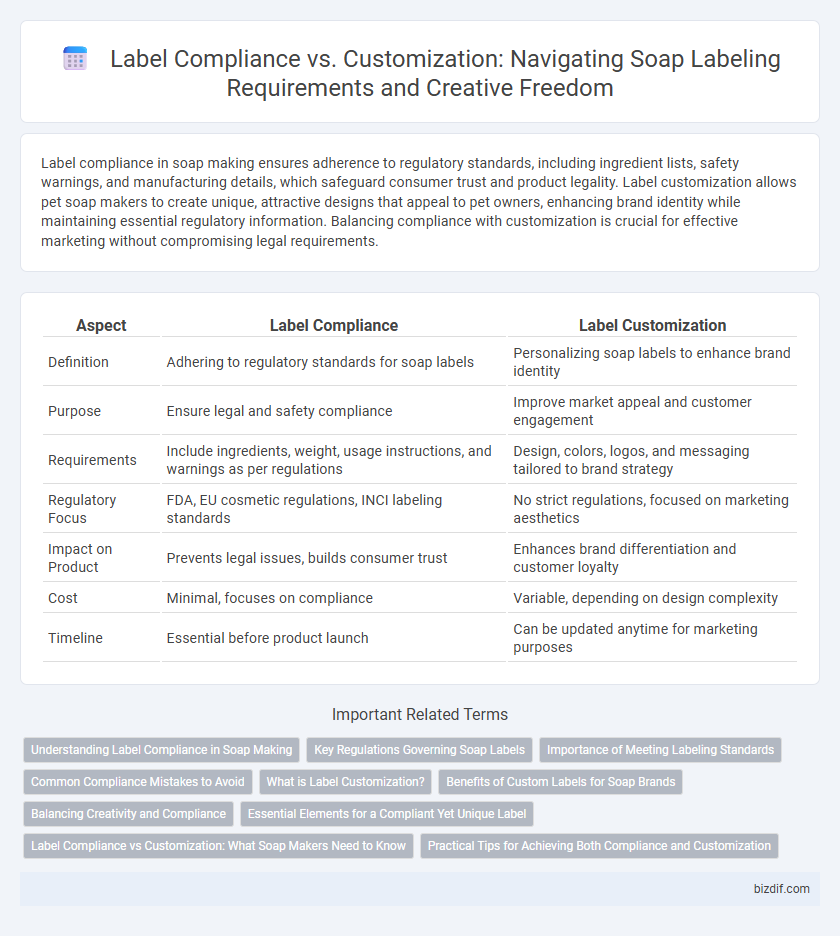Label compliance in soap making ensures adherence to regulatory standards, including ingredient lists, safety warnings, and manufacturing details, which safeguard consumer trust and product legality. Label customization allows pet soap makers to create unique, attractive designs that appeal to pet owners, enhancing brand identity while maintaining essential regulatory information. Balancing compliance with customization is crucial for effective marketing without compromising legal requirements.
Table of Comparison
| Aspect | Label Compliance | Label Customization |
|---|---|---|
| Definition | Adhering to regulatory standards for soap labels | Personalizing soap labels to enhance brand identity |
| Purpose | Ensure legal and safety compliance | Improve market appeal and customer engagement |
| Requirements | Include ingredients, weight, usage instructions, and warnings as per regulations | Design, colors, logos, and messaging tailored to brand strategy |
| Regulatory Focus | FDA, EU cosmetic regulations, INCI labeling standards | No strict regulations, focused on marketing aesthetics |
| Impact on Product | Prevents legal issues, builds consumer trust | Enhances brand differentiation and customer loyalty |
| Cost | Minimal, focuses on compliance | Variable, depending on design complexity |
| Timeline | Essential before product launch | Can be updated anytime for marketing purposes |
Understanding Label Compliance in Soap Making
Label compliance in soap making ensures adherence to legal regulations such as ingredient listing, net weight, and safety warnings as mandated by the FDA or local authorities. Accurate labeling prevents potential fines and product recalls by providing transparent information about allergens, usage instructions, and manufacturing details. Emphasizing compliance guarantees consumer safety and builds trust, while staying within regulatory frameworks essential for market access and brand reputation.
Key Regulations Governing Soap Labels
Key regulations governing soap labels include the FDA's Cosmetic Labeling Guide and the Fair Packaging and Labeling Act, which mandate clear ingredient listings, net quantity, and proper product identification. Compliance requires adherence to specific font sizes, ingredient order, and allergen disclosures to ensure consumer safety and transparency. Label customization must balance creative branding with these legal mandates to avoid misbranding and regulatory penalties.
Importance of Meeting Labeling Standards
Meeting labeling standards is crucial in soap making to ensure product safety, legal compliance, and consumer trust. Accurate label compliance includes required information such as ingredients, expiration dates, and allergen warnings, which protects both manufacturers and buyers from regulatory penalties and health risks. Customizing labels while maintaining compliance allows brands to differentiate products and effectively communicate benefits without compromising legal obligations.
Common Compliance Mistakes to Avoid
Ensuring label compliance in soap making requires adhering to regulatory standards such as ingredient disclosure, allergen warnings, and FDA guidelines to prevent legal issues and product recalls. Common compliance mistakes include omitting required information like batch numbers, misrepresenting ingredient percentages, and neglecting proper labeling for cosmetic versus therapeutic claims. Prioritizing accurate, clear, and complete label data helps avoid penalties while allowing for safe, effective label customization that reflects unique brand identity without sacrificing regulatory integrity.
What is Label Customization?
Label customization in soap making refers to the process of designing and tailoring labels to reflect a brand's unique identity, including customized colors, fonts, logos, and product information. This process enhances visual appeal and helps differentiate products in a competitive market while ensuring key regulatory details remain clear. Customizing labels involves balancing creativity with compliance to meet both marketing goals and legal standards.
Benefits of Custom Labels for Soap Brands
Custom labels for soap brands enhance product differentiation by reflecting unique brand identity and appealing directly to target markets. They allow for flexible design options that comply with regulatory requirements while incorporating creative elements like textures, colors, and fonts to attract customers. Customization also improves consumer trust by providing clear ingredient lists and usage instructions, fostering brand loyalty and increasing sales potential.
Balancing Creativity and Compliance
Balancing creativity and compliance in soap making requires understanding label compliance regulations, which mandate clear ingredient listings, allergen information, and safety warnings to meet legal standards. Label customization allows soap makers to showcase unique branding, artistic designs, and personalized messaging that attract customers and enhance product appeal. Ensuring labels are both compliant and creatively designed supports brand integrity while adhering to regulatory requirements enforced by agencies such as the FDA or CFR Title 21.
Essential Elements for a Compliant Yet Unique Label
Label compliance in soap making mandates inclusion of essential elements such as product identity, net weight, ingredient list, manufacturer contact information, and safety warnings to meet regulatory standards. Label customization allows for unique design elements, brand logos, and color schemes that differentiate products while maintaining legibility and accuracy of required information. Balancing compliance and customization ensures consumers receive critical safety and usage information without sacrificing brand identity or shelf appeal.
Label Compliance vs Customization: What Soap Makers Need to Know
Label compliance ensures soap makers meet legal requirements by including mandatory information such as ingredient lists, weight, and safety warnings, preventing regulatory issues and product recalls. Label customization allows brand differentiation through unique designs, colors, and messaging that attract target customers and support marketing strategies. Soap makers must balance compliance with creativity to produce labels that are both legally sound and visually appealing, ensuring market success and consumer trust.
Practical Tips for Achieving Both Compliance and Customization
Label compliance in soap making requires adhering to FDA guidelines on ingredient listing, proper warnings, and accurate product claims to avoid legal issues and ensure consumer safety. Customization can be achieved by utilizing design software that allows for unique branding elements while maintaining mandatory information clearly visible and legible. Prioritize selecting waterproof and oil-resistant label materials to keep customized labels intact under humid or oily conditions typical in soap environments.
Label Compliance vs Label Customization Infographic

 bizdif.com
bizdif.com